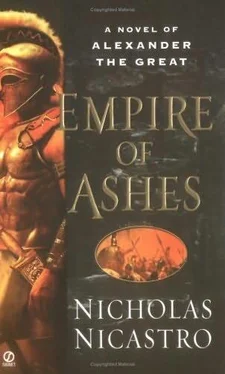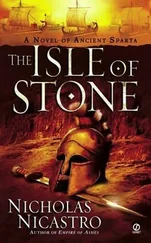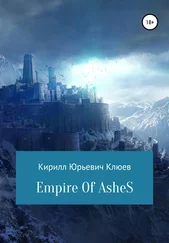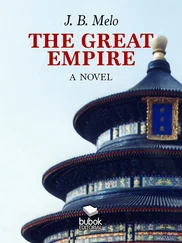Nicholas Nicastro - Empire of Ashes - A Novel of Alexander the Great
Здесь есть возможность читать онлайн «Nicholas Nicastro - Empire of Ashes - A Novel of Alexander the Great» весь текст электронной книги совершенно бесплатно (целиком полную версию без сокращений). В некоторых случаях можно слушать аудио, скачать через торрент в формате fb2 и присутствует краткое содержание. Жанр: Исторические приключения, на английском языке. Описание произведения, (предисловие) а так же отзывы посетителей доступны на портале библиотеки ЛибКат.
- Название:Empire of Ashes: A Novel of Alexander the Great
- Автор:
- Жанр:
- Год:неизвестен
- ISBN:нет данных
- Рейтинг книги:4 / 5. Голосов: 1
-
Избранное:Добавить в избранное
- Отзывы:
-
Ваша оценка:
- 80
- 1
- 2
- 3
- 4
- 5
Empire of Ashes: A Novel of Alexander the Great: краткое содержание, описание и аннотация
Предлагаем к чтению аннотацию, описание, краткое содержание или предисловие (зависит от того, что написал сам автор книги «Empire of Ashes: A Novel of Alexander the Great»). Если вы не нашли необходимую информацию о книге — напишите в комментариях, мы постараемся отыскать её.
Empire of Ashes: A Novel of Alexander the Great — читать онлайн бесплатно полную книгу (весь текст) целиком
Ниже представлен текст книги, разбитый по страницам. Система сохранения места последней прочитанной страницы, позволяет с удобством читать онлайн бесплатно книгу «Empire of Ashes: A Novel of Alexander the Great», без необходимости каждый раз заново искать на чём Вы остановились. Поставьте закладку, и сможете в любой момент перейти на страницу, на которой закончили чтение.
Интервал:
Закладка:
I was much entertained by Aeschines’s account of the siege of Tyre. The problem, of course, was that the Persian fleet was still sailing unopposed in the Aegean, free to foment resistance and harass Macedonian garrisons. To deal with this fleet Arridaeus suggested a novel strategy: Alexander would not assault it directly, as his navy was small and the enemy employed vessels manned by seasoned Phoenician and Cypriot seamen. Instead, he would wear down the Great King’s navy by depriving it of safe harbor. This would require not only the closure of all the ports in Asia Minor, but also the subjugation of the Phoenician cities on the Levantine coast. Old Parmenion disagreed, urging a fight at sea that would, in any case, be less expensive and time-consuming than conquering every harbor. Alexander heard his advice, weighed it, and ordered his fleet disbanded. He would gamble all on Arridaeus’ land strategy.
As fast as Alexander’s army marched, news of his victories spread faster. Marathus, Byblos and Sidon opened their gates to him, and emissaries from Tyre, the richest of the ports, made pledges of neutrality. Alexander accepted the Tyrians’ goodwill gifts of provender and a golden crown, asking only that he be allowed into their city to make a sacrifice to Heracles.
“That, alas, we cannot allow,” said the head emissary, heaving a thespian sigh. “The Great King would no doubt see that as a violation of our neutrality.”
“Perhaps he would see it that way-but I will not accept a refusal. There is no neutrality possible now.” He left unsaid the obvious concern that any port not in his allegiance after he marched east could be used by the enemy’s navy to support operations against his rear.
“May we suggest an alternative for your observance, O King? The sanctuary of Heracles Palaeotyros, for instance?”
“Is it within the town?”
“Your eminence, it is within our territory, but a short distance outside the city proper.”
“I think,” said the King, “that the only alternative to a sacrifice within your gates will be an unpleasant one for you.”
At this the haughty Tyrians, whose city stood on an offshore island ringed with high walls, dropped all pretense of humility. They laughed in Alexander’s face.
“Unless you Greeks have gills, Tyre can never be taken!”
At that, Alexander told them to prepare to defend themselves.
IX
The King called a war council to hear the advice of his generals. The city, he was told, stood on an island half-mile off a windswept coast. She was protected by massive fortifications 150 feet high on the landward side, only somewhat lower to seaward. As Alexander had sent away his only ships, taking the city from the water would be impossible. “Then it must be from the land,” he concluded. Constructing a mole across the strait was be likewise impractical, said his admiral Nearchus, as the channel was deep there. “How deep?” Alexander demanded. No one knew.
At this point Nearchus argued that the Persian fleet was not out of action and might appear at any moment to support the Tyrians (which was true), and that the city might be safely bypassed anyway (which was not). But his objections only confirmed Alexander in his course: he would take the impregnable island city from the land.
The Macedonians seized the mainland coast across the Tyrian strait. Battalions of Foot Companions and mercenaries were ordered to take off their armor and don workshirts. Whole forests were cut down for pilings, and all moveable boulders in the vicinity roped, dragged, and dropped into the channel to support the construction of the greatest artificial causeway ever conceived.
While these preparations were underway, the Macedonian camp was shaken by an ominous sign: as the army’s bakers removed their bread from the ovens, they found drops of human blood in the loaves. Panic spread among the Greeks in a way it had not before the battles at the Granicus or Issus. The campaign was saved by Alexander’s personal seer, the Telmissian Aristander. Instead of disaster, Aristander interpreted the bloody bread as a promising sign: since the blood flowed on the inside of the bread, it must mean that the force within the city was doomed, not the attackers. As this seemed reasonable to most of the Macedonians, work resumed in earnest.
Alexander searched his army for strong swimmers who might survey the underwater course of his mole. As this was dangerous work, he promised each survivor a talent for his trouble. So confident were the Tyrians that the siege would fail, however, that they declined to shoot at these scouts as they appeared under their walls. Instead they laughed, asking them whether their King thought himself Poseidon’s master.
The causeway was supposed to be wide enough for an eight-man front of Foot Companions to march across, and high enough for the top of it to be above the winter swells. Working in day and night shifts, the Macedonians quickly finished the section over the shallows. As his men worked, the enemy sent out boats with crack archers in them. Thinking perhaps that Alexander was bluffing, at first they resorted only to insults, jeering at the workmen, telling them they were a race of mules, not warriors. When this failed to stop the work, the archers brandished their bows. Finally, they commenced shooting at the workers, forcing them off the mole. Alexander brought up Cretan bowmen equipped with flaming arrows, driving the boats away. To protect his men, he altered the design of the mole, equipping it with a pair of wheeled towers, topped with rock-throwers, that could be rolled forth as the work proceeded.
Unable to approach the causeway from the water, the Tyrians sent boats filled with cutthroats down the coast to attack the work-crews inland. Alexander detailed his Illyrian auxiliaries to protect the workers. The enemy turned to diplomacy, paying the Arab tribes of Mt. Lebanon to harry the Illyrians. In response, Alexander launched a land campaign, bringing the Arabs to heel in just ten days.
The work proceeded into greater depths. The magnitude of the task seemed to grow more and more absurd, like burying the ocean, as we watched tons of stones and trees disappear into the water. The head of the mole, meanwhile, was now in range of archers on the city walls, which they used with telling effect. Alexander countered the Tyrian bowmen by erecting sheets of canvas around the head of the mole to conceal his men as they worked their way closer. Poseidon made his allegiance known by sending strong winds through the channel to rip away the canvas, leaving the workers exposed to enemy fire. Alexander replaced the canvas with heavy skins, weighted down at the bottom with shorn logs, which had the additional dividend of breaking the high waves. Poseidon grumbled and bided his time.
Alexander was often out on the mole himself, exposing himself to danger, always ready with words of encouragement for his men. At last his faith seemed to bear results, as the Macedonians looked down to see the mole’s foundation inch toward the surface. Morale surged; it seemed as if the task was possible after all.
Understanding that this was a key moment, the Tyrians launched their counterstroke: a sulphur-caked merchant vessel, stripped of everything that would not burn, filled to the gunwales with fuel and choice accelerants. To insure that the fire ship would ground herself on the mole, they shifted its ballast aft, so that its prow was pitched free of the water. The next windy day their best oarsmen towed it into the channel and, with spirited war-cries, propelled it toward the enemy.
The ship struck home and exploded in an enormous conflagration. With particular ingenuity, the Tyrians suspended cauldrons of boiling pitch between the ship’s masts, so that when these collapsed additional fuel poured onto the blaze. Mounds of unused timber, cordage, canvas and idle catapults went up. The fire spread so quickly that the guards in Alexander’s towers were forced to dive into the sea. Enemy triremes swarmed around the helpless Macedonians, beating them senseless with clubs before taking them all as hostages. The Tyrian archers, meanwhile, drove back anyone coming out to fight the fire. The entire mole burned to the waterline.
Читать дальшеИнтервал:
Закладка:
Похожие книги на «Empire of Ashes: A Novel of Alexander the Great»
Представляем Вашему вниманию похожие книги на «Empire of Ashes: A Novel of Alexander the Great» списком для выбора. Мы отобрали схожую по названию и смыслу литературу в надежде предоставить читателям больше вариантов отыскать новые, интересные, ещё непрочитанные произведения.
Обсуждение, отзывы о книге «Empire of Ashes: A Novel of Alexander the Great» и просто собственные мнения читателей. Оставьте ваши комментарии, напишите, что Вы думаете о произведении, его смысле или главных героях. Укажите что конкретно понравилось, а что нет, и почему Вы так считаете.












